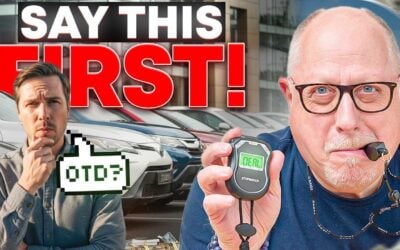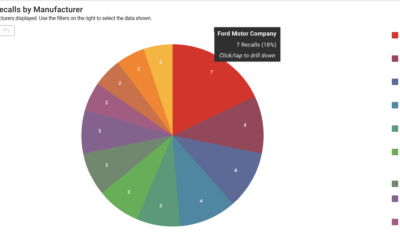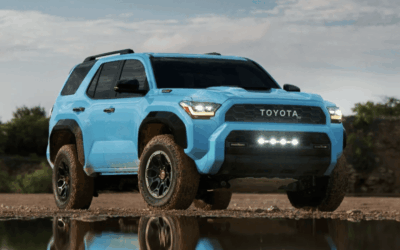As if buying a car wasn’t tricky enough, the equation becomes even more complex when the topic of your trade-in comes into play. If you’re like one of the millions of car buyers each year that trades-in their car at the time of purchase, you’re most likely wondering, “when do I bring up the trade-in during the negotiation process so that I get the best deal?”
Well, fortunately for you, we’re going to discuss when to bring up your trade-in (and more) today. If you’re less interested in reading about how to navigate your trade-in, you can watch the YouTube video above. If you prefer to read, then continue on below, over the next few minutes we’ll explain exactly how to approach your trade-in during the car buying process.
Without further ado, let’s dive in!
They’re two separate transactions
First and foremost you need to recognize that buying a car and trading-in a car are two separate transactions, and each should be treated as such. Negotiating a car purchase, and selling your existing vehicle are independent of each other, however dealers will diligently try to combine the two into one “deal.” Why? Because when you’re working two transactions at once there are more opportunities to generate profits (if you’re a dealer), and lose focus (if you’re the consumer).
Why should you approach the trade-in process and the negotiation of a vehicle purchase as two separate events? It’s simple, by focusing on selling your car for the greatest amount of money possible, you’ll sell your car for more, and by focusing on negotiating the best possible out-the-door price on the vehicle you’re purchasing, you’ll get the best deal possible. Attempting to combine the two simply muddies the waters and allows the dealer the opportunity to “pull a fast one” on you.
Negotiate the out-the-door price
Since your purchase and your trade-in are two separate transactions, you should turn your focus to negotiating the best possible out-the-door price. If you’re unfamiliar with the term “out-the-door price” then I highly suggest you read our guide here, or listen to this podcast episode on out-the-door price (or watch the video above). We created a 100% free out-the-door price calculator that you can access at any time as well to get an estimate for what the OTD price will be on any car you’re interested in.
To negotiate the best out-the-door price you’ll want to follow all of the best practices in the resources above, as well as what we outline in Deal School. For example, if you know how long a vehicle has been on a dealer’s lot, what the local market days supply is, and more, you’ll be able to negotiate a better out-the-door price.
Once you have agreed to terms with the dealer on the vehicle’s total price, you should then transition the conversation to your trade-in, and here’s how to approach that …
Get multiple quotes on your trade-in
My recommendation is simple: get as many competitive quotes for your trade-in as possible before engaging with the dealer. For example, you should get a quote from CarEdge, and any other applicable major used car dealers in your area before discussing your trade-in with the dealer you are going to buy the car from.

It is important to understand that most car dealers will lowball you on their initial trade-in offer. This should come as no surprise. Dealerships are incentivized to purchase your vehicle for as little as possible so that when they sell it to another car buyer they maximize their profit. Your objective is the opposite. You want the greatest amount possible when you sell your vehicle, and the only way you’ll get that is if you get multiple quotes from a handful of dealers in your area.
Another option worth considering is also selling your car to a private party, however if you’re objective is to trade-in the vehicle (and there are financial reasons why you’d want to do this), then getting offers from private parties won’t really help your cause. The point of getting multiple quotes from other dealers is to have leverage with the dealer where you are purchasing your new vehicle, and a verbal offer from a private party isn’t much of a negotiating chip.
Once you have these quotes you can move on to the next phase of the negotiation process.
Vehicle trade-in sales tax benefit
At this point it’s clear that the trade-in of your existing vehicle, and the negotiation of the new vehicle you are purchasing are two separate events. First you should negotiate a fair out-the-door price, and then bring up competitive quotes from other dealers to purchase your car.
Now, let’s say the dealer makes a compelling offer, but they don’t match the highest offer you’ve received from another dealer. What do you do? Which offer do you take? You need to understand the sales tax benefit of trading a car in versus selling it.
The trade-in sales tax benefit is different in each state, so please double-check with your local tax codes before signing any documents, however in the state of California, the District of Columbia, Hawaii, Kentucky, Michigan, Montana, Oregon, and Virginia there is no sales-tax benefit from trading in your vehicle.
Update for 2022: In Michigan, you can reduce the taxable value of your new car by up to $8,000 and reduce your sales tax by up to $480.
Update for 2022: In Arkansas you can sell your vehicle private party and still retain a sales tax basis benefit.
This means that if you trade-in your vehicle you will not receive any sales tax credit applied to the purchase of your next vehicle. In all other states (again double-check with your local tax codes) you receive a sales tax credit applied to the price of the new vehicle you are purchasing.
For example:
- You’re purchasing a $20,000 vehicle
- The sales tax is 10 percent in your state
- Your total sales tax would be $2,000
- You’re trading in your current car for $12,000
- The new basis for the sales tax on your purchase is decreased by $12,000
- You now only pay $800 in sales tax on your purchase
In this scenario it would make more sense to trade-in your vehicle so long as the dealer is offering you an amount that is within $1,200 of your highest direct-sale offer.













Great information. However, what happens when your trade-in value is about the same as the new vehicle cost. Is any dealer willing to make a deal like that where your difference between new and trade-in is so close? Thanks
I live in Virginia but bought my new car in Maryland. Virginia does not offer any tax credit when you trade in your car in Virginia . My question is because I traded in my car to the Maryland dealership I purchased my new car from, can I as a Virginia resident get the trade in credit the state of Maryland allows at the time of purchase?
Kentucky does provide a sales tax credit on the trade-in value, since July 2014. See KY Department of Revenue for reference https://revenue.ky.gov/Property/Motor-Vehicles/Pages/Motor-Vehicle-Usage-Tax.aspx